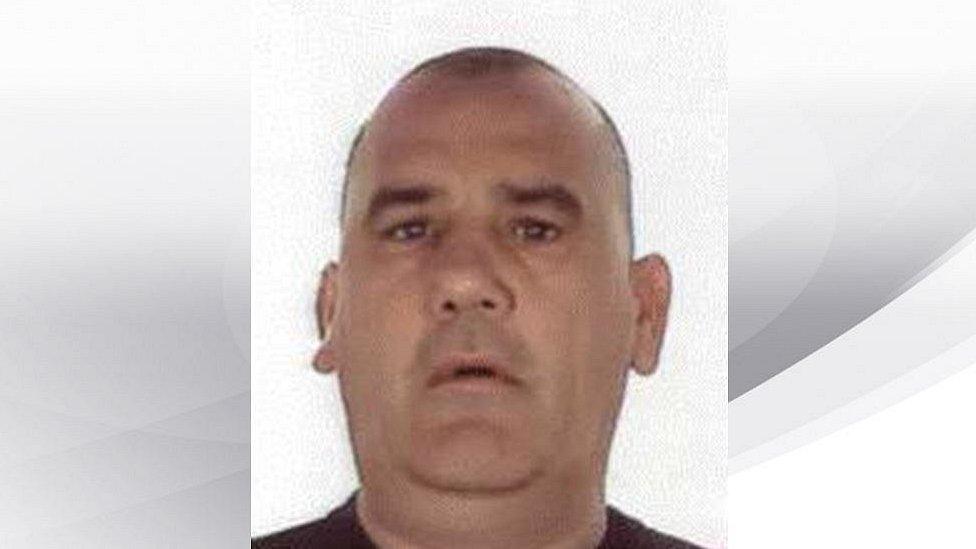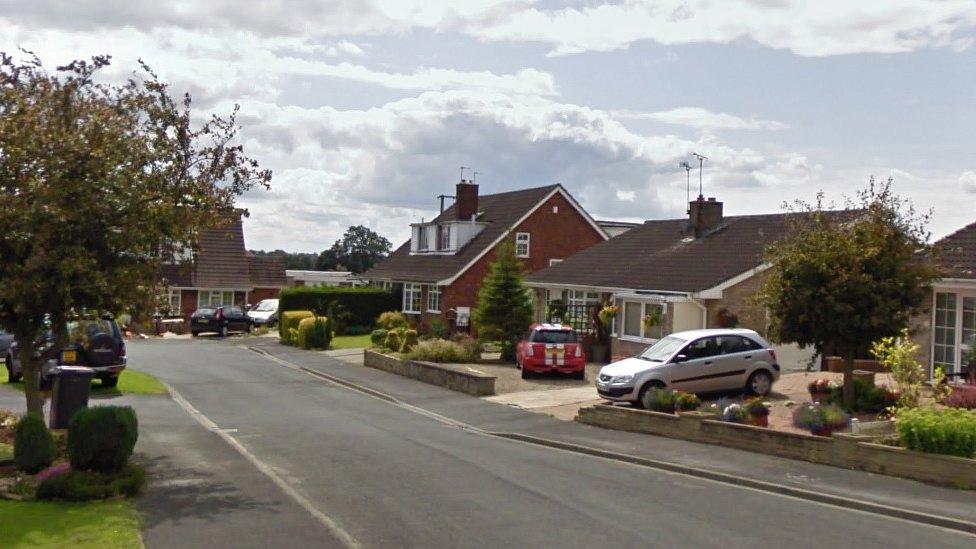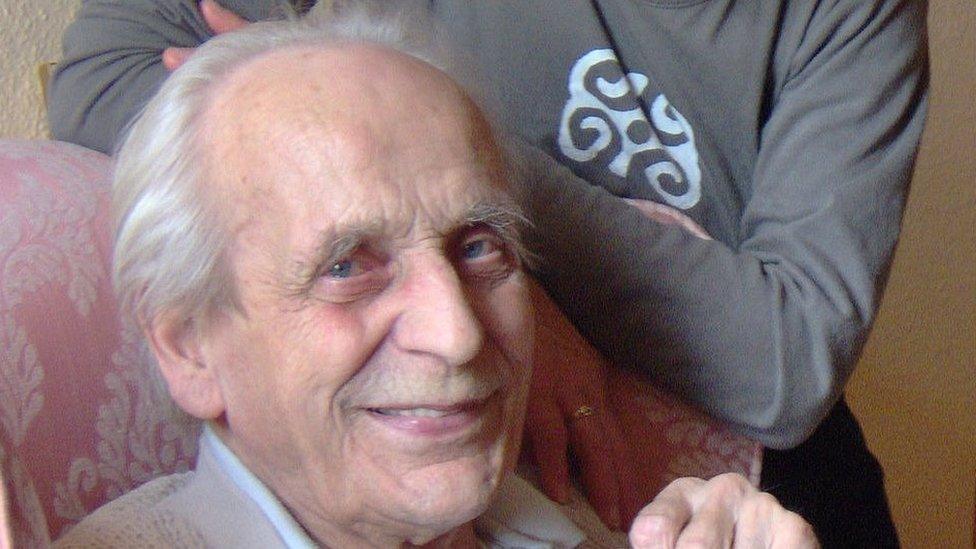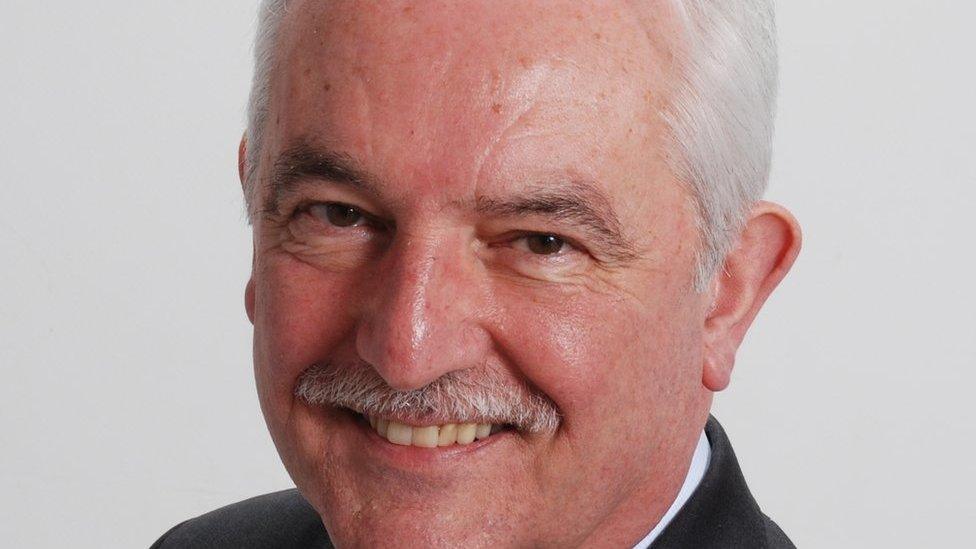'Power of attorney meant Dad lost everything'
- Published
Lesley Willett's father, a veteran suffering from dementia, was exploited by his neighbour
A retired senior judge has warned the power of attorney lacks safeguards, saying he would never sign one himself.
But Frank Willett, a Dunkirk and Normandy veteran, did - and was exploited by his neighbour Colin Blake.
Frank's daughter, Lesley, lived 300 miles away from her father. She was in South Wales and he was in Yorkshire.
Suffering from dementia and in his early 80s, in 2003 Frank made Blake his attorney, giving him responsibility for his financial affairs.
Blake had befriended widower Mr Willett and took him to a local solicitor's office, where the document was drawn up for enduring power of attorney and Frank signed.
Lesley and her husband Brian Felton believed Frank's assets were safe.
But what they didn't realise was that just weeks after the papers were signed, Colin Blake had begun taking out large sums of money.

Colin Blake eventually sold Frank Willett's house and moved to France
"I didn't think the bank would allow wholesale looting of someone's account," Lesley says.
Her father had been a regular customer for years with the bank. He'd go in every week and cash a cheque for £70, and all of his bills were paid by direct debit.
He had pensions from the army and the civil service as well as his state pension. He was careful with money and had built up substantial savings of £60,000.
In February 2003, Blake withdrew nearly £9,000 from Mr Willett's account in a single transaction. As he had power of attorney, the bank didn't contact Brian and Lesley.
Blake drew out more money, using the sums to pay his own bills.

Mr Willett lived next door to Blake in Kirby Hill in Yorkshire, 300 miles away from his daughter
Frank's health deteriorated and in September 2004 he was moved to a care home.
Colin Blake registered the enduring power of attorney (EPA) with the Court of Protection, which allowed him to sell Frank's house, a two-bedroom bungalow in North Yorkshire.
Lesley and Brian challenged the power of attorney in court - but they had no idea that Frank's savings account was empty, and they couldn't prove that Colin Blake was unfit to be Frank's attorney.
The judge upheld the document, although he did order Blake to provide annual accounts to the court - a more stringent measure than the usual procedure.
The couple and their solicitor repeatedly contacted the Public Guardianship Office, and the Court of Protection, which oversees attorneyship, saying they believed there were discrepancies in the accounts.
But they were told everything was satisfactory.

In early 2007, visiting her father in the care home in Yorkshire, Lesley learned that Blake was selling his own house, liquidating his company and moving to France. Frank's care bills were in arrears.
Lesley knew her father's house had been sold for over £130,000 and could not understand where the money had gone.
It was only in early 2008 that a new body - the Office of the Public Guardian - investigated, and revoked the power of attorney.
Lesley was appointed deputy by the court instead - responsible for her father's finances under the court's supervision.
'Everything was gone'
She discovered all of her father's money had gone. Her father's medals - from 35 years service in the army - had gone.
Her mother's wedding ring and her jewellery and all the family photographs and documents had also disappeared.
"It was devastating," she says. "It took his memories."
She called the police, who began to investigate Blake.
Lesley visited Frank for his birthday and took him to visit her mother's grave. She told him Blake wouldn't be bothering him any more, and that the care home staff and his family would be protecting him.
"He had tears streaming down his face and he said: 'That's the best birthday present I've ever had.'"
Frank died in 2009. Lesley and Brian had to go to court to overturn a will Frank had made under Blake's influence.
The police pursued Blake to France. Last month he pleaded guilty to theft and was sentenced to four-and-a-half years.
It's unlikely that Lesley will ever get any money back. But she wanted to see justice done for her father, and for others to learn from her experience.

Lesley Willett was eventually appointed as her father's deputy, which meant she took over his affairs
Since this case, there have been changes to power of attorney and the Court of Protection.
In the past, a EPA could be drawn up with little oversight - but when it came to registration, it could be subject to scrutiny and challenge. All the relatives of the person concerned would be contacted at that point.
Now with the newer Lasting Power of Attorney, or LPA, a professional, or someone who has known the subject of the order well for years, has to provide a certificate for the document to be drawn up - but registration has been made far simpler.
Relatives are no longer contacted. Also, the Office of the Public Guardian, an executive agency of the Ministry of Justice, has more powers to investigate complaints about attorneys than its predecessor, the Public Guardianship Office.
The retired judge, Denzil Lush, cited a recent case involving 94-year-old widow Gladys Meek, from Derbyshire.
Her husband's niece and great niece were deputies. They used her money to buy cars, laptops, designer handbags, and season tickets to Derby County Football Club.
But after a court decision, a £275,000 bond was called in and so the money could be recovered.
- Published15 August 2017
